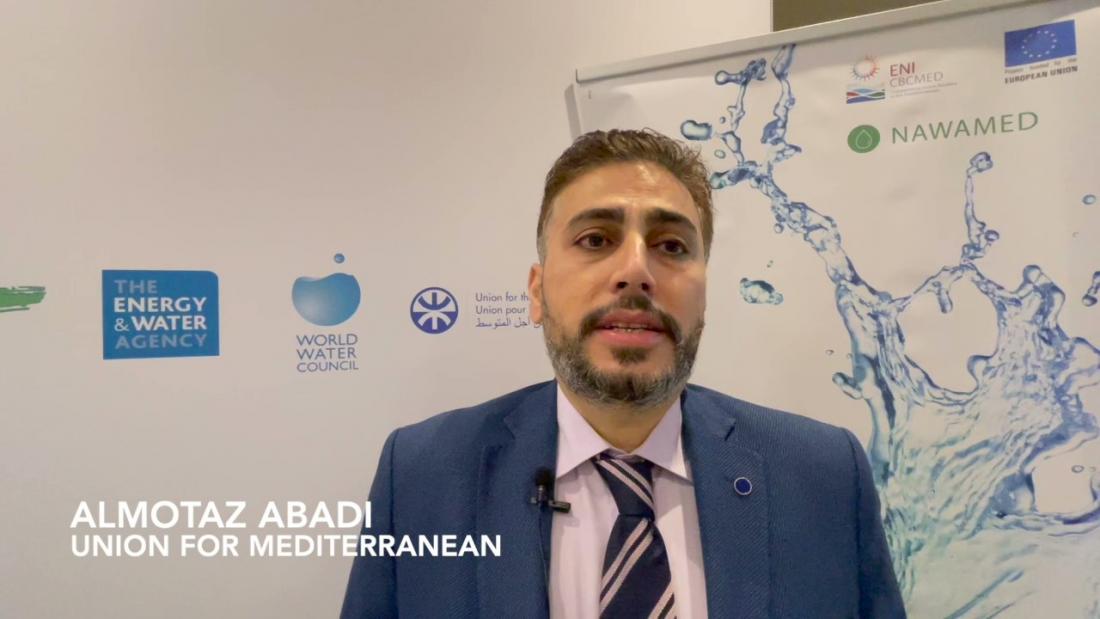“Investing in water reuse means investing in health, mitigation, welfare, jobs” – NAWAMED interviews Water Managing Director of Union for Mediterranean, Almotaz Abadi’s interview

Last December the Euro-Mediterranean centre for the sustainable development – SVI.MED, partner of NAWAMED and MEDWAYCAP projects, attended the 4th Mediterranean Water Forum (MWF) in Malta to contribute its experiences and establish new relationships with potential international partners. The occasion was tackled to interview some speakers with the aim to deepen how to support innovative solutions and technologies to increase efficiency starting from the reuse of treated wastewater.
The MWF has been organized by the Water&Energy Agency - EWA of Malta, partner with SVI.MED of both projects, the Institut Méditerranéen de l’Eau - IME and the Union for the Mediterranean - UfM.
The UfM is an intergovernmental Euro-Mediterranean organization which brings together all countries of the European Union and 15 countries of the Southern and Eastern Mediterranean. It participated to the MWF with Almotaz Abadi, who is Water Managing Director for UfM.
It is important for us to follow a holistic approach in terms of water management in the Mediterranean. The problem is in fact the deficit between the availability of resources and demand.
The solution is therefore to find new resources, and the new resources are either desalination or the reuse of wastewater
Mr. Abadi explained why it’s important to apply the holistic approach to our ecosystem and our socio-economic reality while comparing the energy needed for each solution. This approach, in fact, allow us to better understand that:
We are protecting the environment, we are protecting public health and we are getting a new water resource for our environmental ecosystem and for farmers
The real point, when talking about wastewater reuse, is that we are setting an example of circular economy.
In promoting water reuse we are promoting efficient and responsible consumption, but also efficient and responsible production, starting with the food chain.
And that's not all: the quality of the water resulting from reuse must adhere to very precise quality standards, which comply with the law. It is not possible to distribute water that contains chemicals. This is another reason why the reuse of waste water should not scare us. However, for this to happen, education, training and capacity building are needed, involving managers, farmers, politicians and decision makers, to explain how best to use water reuse
Who are the stakeholders in this process?
Stakeholders are all of us, from politicians to civil society. The level of awareness is very important. That is why the most important thing is to convince governments to invest in the reuse of water, showing the added value of this sector.
It takes a lot of infrastructure, and for that you need to show the beneficial social impact. Investing in water reuse means investing in health, mitigation, welfare, jobs
The MWF allowed the NAWAMED and MEDWAYCAP projects to share the pathway for to strengthening the value and impact of innovative integrated Non-Conventional Water Resources management solutions through a Mediterranean Alliance for a collective learning towards effective policies and innovation processes.
I always say that information is power, and information is power if we spread it and disseminate it. If we put it on the shelf, you will be proud of yourself but nobody will know what you are doing. So, it is a key element because we cannot educate, we cannot empower people if we do not have the ability to communicate
Watch a clip of the video interview here









